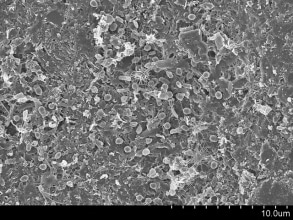Anyone who has spent any amount of time in a cell or tissue culture lab will have experienced contamination at some point. You might not admit it, or want to admit it, but you know you have! I performed my graduate work in a basement university lab with an out-of-service emergency exit door in the cell culture lab itself. You can imagine how difficult it was to keep this room clean and my cultures free of contamination, especially the primary prostatic epithelial cell cultures.
One thing we must clear up: there are two categories of contamination that mammalian cell cultures can encounter. The first is chemical, including impurities in your medium, serum and even your H2O supply. The second is biological, including bacteria and fungi. We should also consider cross contamination with other cells, but cell line authentication is a whole other story.
Common antimicrobial agents
One of the most common ways to prophylactically prevent bacterial and fungal infection is to supplement your culture medium with an antibiotic and/or antimycotic. Both antibiotics and antimycotics function by degrading the cell membrane of the infectious bacterium and fungus, respectively. There are many different antibiotics, but the most widely used antibiotic in cell culture is a Penicillin-Streptomycin solution at a working concentration of 50-100IU/ml penicillin and 50-100µg/ml streptomycin. The most widely used antimycotic in cell culture is amphotericin B at a working concentration of 2.5µg/ml.
Enjoying this article? Get hard-won lab wisdom like this delivered to your inbox 3x a week.

Join over 65,000 fellow researchers saving time, reducing stress, and seeing their experiments succeed. Unsubscribe anytime.
Next issue goes out tomorrow; don’t miss it.
Those pesky critters
There is no argument that biological contamination should be avoided at all cost. Contamination certainly creates an untimely inconvenience to your research (usually just when there’s an abstract deadline looming). However, and more importantly, some low and as yet undetectable levels of contamination may affect the behavior of the cells themselves. Of course, this depends of the contaminating agent and the cell type being cultured, but can lead to spurious results in, for example, cellular and biochemical assays.
To fight or not to fight?
It is advisable to supplement culture medium with antimicrobial agents when establishing primary cell (or tissue) cultures: this will help to inhibit contamination from the source material. However, many cell culture laboratories routinely add antibiotics and antimycotics to all culture media, while others, including ATCC (American Type Culture Collection), do not use either reagent for routine cell culture. In fact, most manufacturer data sheets will inform you that long term use of amphotericin B is toxic to cells. Furthermore, long term use of both antibiotics and antimycotics may in fact mask the presence of low levels of microbial contamination.
So, if I don’t treat my cells they’ll develop low levels of infection and behave out of character and if I do treat them they’ll develop low levels of infection and behave out of character. What to do??
Well, there are occasions when the use of antibiotics and antimycotics is advisable; for example as I mentioned above, during the establishment of a primary culture, or while propagating specific valuable stocks, or to eradicate any contamination that should happen to arise. In gene targeting the addition of antibiotics to medium allows positive selection.
Get the Mr. Sheen out!
However, in the absence of antimicrobial agents, nothing beats good ol’ fashioned aseptic technique. Ensure you work cleanly, effectively and safely within the tissue culture hood. I always worked from a clean side (in my case the right) to the dirty side (the left) of the hood minimizing any chance of contamination. I also can’t emphasize the importance of a clean cell culture room.
As I worked in such a dusty environment during my graduate research our centrifuge even got a weekly wash! Clean your waterbaths, your centrifuges and your incubators regularly. It’s good to wash things with Virkon (or a similar detergent) before wiping down with 70% ethanol. In fact, a handy little tip I was taught is to use Virkon if I accidentally spilled fluid in the cell culture hood, before wiping with 70% ethanol (ethanol is a fixative after all so the detergent gets a chance to clean first).
An item that is often overlooked is the cell culture hood itself. Sure, we all wipe it down before we start and after we finish. Don’t we? But have you ever looked under the tray? Is there anything lurking under there? Don’t forget to give your cell culture hood a good clean every month or so.
If you take care of your cells and their home (even in the absence of antibiotics and antimycotics), your cells will take care of you and your research!
You made it to the end—nice work! If you’re the kind of scientist who likes figuring things out without wasting half a day on trial and error, you’ll love our newsletter. Get 3 quick reads a week, packed with hard-won lab wisdom. Join FREE here.






